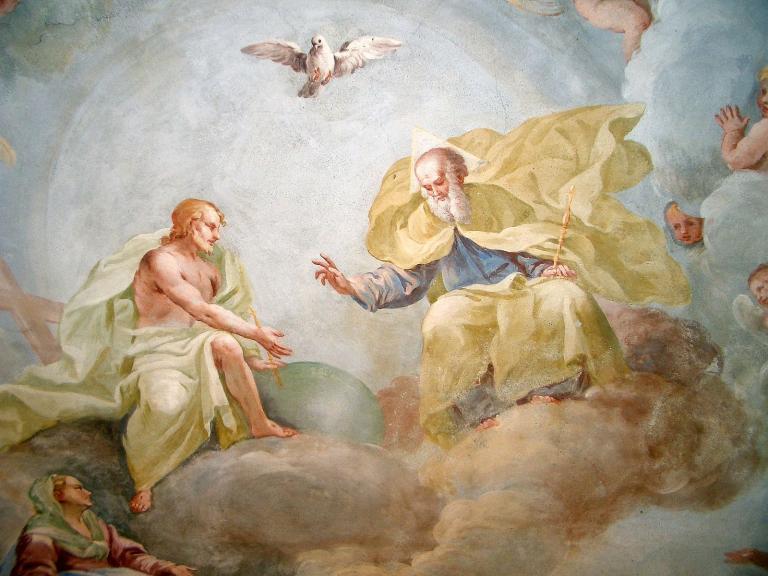
Islam is an absolutely rigorous, pure monotheism. “To God alone is true worship due,” declares the Qur’an.[1] In this regard, it resembles Judaism rather more than Christianity. There is no God-man in Islam, no divine Son. A chasm separates man from God. Even the doctrine of the Trinity, with its claim that three persons are really one God, has never satisfied Muslim critics:
People of the Book, do not transgress the bounds of your religion. Speak nothing but the truth about God. The Messiah, Jesus the son of Mary, was no more than God’s Messenger and His Word which He conveyed to Mary: a spirit from Him. So believe in God and His Messengers and do not say: ‘Three.’ Forbear, and it shall be better for you. God is but one God. God forbid that He should have a son! … The Messiah does not disdain to be a servant of God, nor do the angels who are nearest to Him.[2]
From a Latter-day Saint point of view, the Qur’an is crucially wrong on this important matter. Yet I have to confess that I have always found an amusing implication here. Many enemies of The Church of Jesus Christ of Latter-day Saints like to denounce us as polytheistic and therefore as non-Christian. They think that they escape the charge of polytheism themselves by simply declaring that the Father and the Son and the Holy Spirit are somehow, incomprehensibly, one. But the Muslims, whose mathematical abilities are historically well developed (as we shall see, they invented algebra), are not taken in by this. They have frequently denounced mainstream Christianity as polytheism. But it is not only Christians who are under the accusation of worshiping more than the one God. Even Jewish monotheism is suspect in the Qur’an.[3].
The irony is compounded by the historical fact that some early Latter-day Saints saw themselves as monotheistic allies of the Muslims, confronting a Christianity corrupted by saint-worship and the veneration of relics. (After all, they correctly reasoned, Latter-day Saints worship only one God. As much as Latter-day Saint scriptures and leaders may talk of “the Gods,” our worship is strictly limited to the Father. Therefore, we cannot plausibly be considered polytheists—a label we vehemently reject.) This is the thinking that undergirds some of Parley P. Pratt’s more militant declarations:
Mahometanism included the doctrine that there was one God— that He was great, even the creator of all things, and that the people by right should worship Him… On this account, on the simple subject of the Deity and His worship, if nothing more, I should rather incline, of the two, after all my early traditions, education, and prejudices, to the side of Mahomet, for on this point he is on the side of truth, and the Christian world on the side of idolatry and heathenism.[4]
Now, if we take Mahometanism during those dark ages, and the corruptions that are so universally prevalent over the earth, and the idolatrous systems of religion, falsely called Christianity, and weigh them in a balance; with all my education in favor of Christian nations and Christian powers, and Christian institutions, so called, with all my prejudices of early youth, and habits of thought and reading, my rational faculties would compel me to admit that the Mahometan history and Mahometan doctrine was a standard raised against the most corrupt and abominable idolatry that ever perverted our earth, found in the creeds and worship of Christians, falsely so named.[5]
So far as that one point is concerned, of worshipping the one true God under the name of Mahometanism, together with many moral precepts, and in war acting only on the defensive, I think they have exceeded in righteousness and truthfulness of religion, the idolatrous and corrupt church that has borne the name of Christianity.[6]
So seriously does the Qur’an take this issue that it falls into what appears to be an inconsistency. It generally speaks with favor of both Christians and Jews. They are the “People of the Book,” and it tells them that they have little to worry about if only they will live up to the remnants of revelation still in their custody. But the Qur’an labels trinitarian Christians “unbelievers” at one point and threatens them with an unpleasant fate if they do not repent of their grave theological error:
Unbelievers are those that say: ‘God is the Messiah, the son of Mary’ For the Messiah himself said: ‘Children of Israel, serve God, my Lord and your Lord.’ He that worships other gods besides God shall be forbidden Paradise and shall be cast into the fire of Hell… Unbelievers are those who say: ‘God is one of three.’ There is but one God. If they do not desist from so saying, those of them that disbelieve shall be sternly punished… The Messiah, the son of Mary, was no more than a Messenger: other Messengers passed away before him. His mother was a saintly woman. They both ate earthly food.[7]
[1] 39:3.
[2] 4:171-72. Note that the Qur’an seems to call Jesus God’s “Word” here, much as does the first chapter of the gospel of John. Thus, even though it rejects Christ’s divinity, the Qur’an retains an extraordinarily high and reverent view of him.
[3] See 9:30-31. Most Western scholars would say that the denunciation of Jewish polytheism here rests upon a misunderstanding, but it is possible that at least some of the Jews of Arabia held false doctrines. Certainly the Qur’an’s rebuke does not seem to apply to Judaism as we know it, either today or historically.
[4] Journal of Discourses 3:38.
[5] Journal of Discourses 3:40.
[6] Journal of Discourses 3:41. As noted above, Elder Pratt was probably guilty of some exaggerated rhetoric here.
[7] 5:72-73, 75; compare 5:17.











